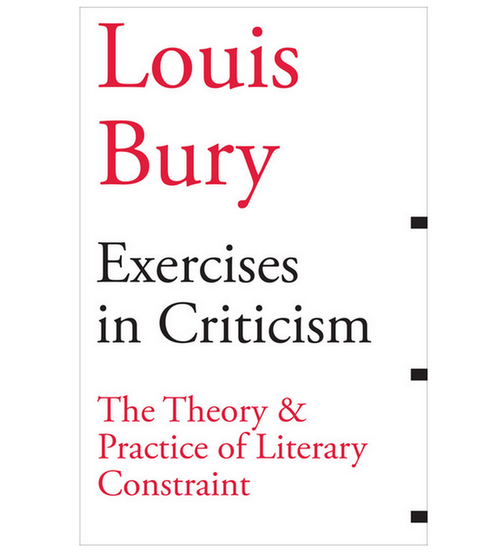
The Following is an excerpt from Louis Bury’s Exercises in Criticism: The Theory and Pratice of Literary Constraint (Dalkey Archive Press, February 2014). The book uses rules and procedures to write poetic and autobiographical criticism about works of literary constraint.
Midway through this book project, in the course of a group conversation at a cocktail party, I happened to mention, in passing, that my father is an electrical engineer. Sensing that this seemingly innocent biographical detail might relate to my interest in constraint, Wayne Koestenbaum suggested I write about my father, electrical engineering, and constraint as part of the project. The suggestion appealed to me but the prospect of writing directly on the topic didn’t, so I asked my father if he would be willing, as his birthday present to me that year, to answer a questionnaire. I had intended to use the questionnaire, both my questions and his responses, as raw material for some future, as-yet-undetermined procedure, but the completed questionnaire felt more than self-sufficient, felt, in fact, as though tampering with it—even so much as tampering with my father’s spacing and typography—would disturb the halting equilibrium into which we had both settled over the years.
—Louis Bury
Write down a word that comes to mind when you think of yourself.
precise
What language do you think in?
It is hard to tell. I think that I am still translating from Polish to English. Sometimes when I work with numbers, I might count in Polish. I acquired very good background in Polish language with good writing skills. In high school on the last final exam in Polish a student is not allowed to make an orthographical error. If this could happen, a student must repeat the entire year.
Maybe they have different rules today not like in 1964.
Do you think differently in different languages?
Yes, of course. I still make many mistakes when I translate from Polish to English.
For example the verb might be located at different part of the sentence.
Meditate on the ways in which math is like a language.
If you analyze logic circuits, one can say that this is like a language.
Does your heart thrill at the thought of an AND gate?
I don’t find myself excited by working with gates. For me this is just a tool to analyze combinational or sequential logic circuits. My students find digital circuits easier to comprehend than analog. Generally, I don’t like digital circuits. I prefer analog where my doctoral thesis is primary based on it.
How would you characterize your childhood?
I pleasantly remember my childhood. I had lots of freedom since my parents were both working.
I played outside from morning to evening. Many hours...
You have reached your article limit
Sign up for a digital subscription and continue reading all new issues, plus our entire archives, for just $1.50/month.
Already a subscriber? Sign in




